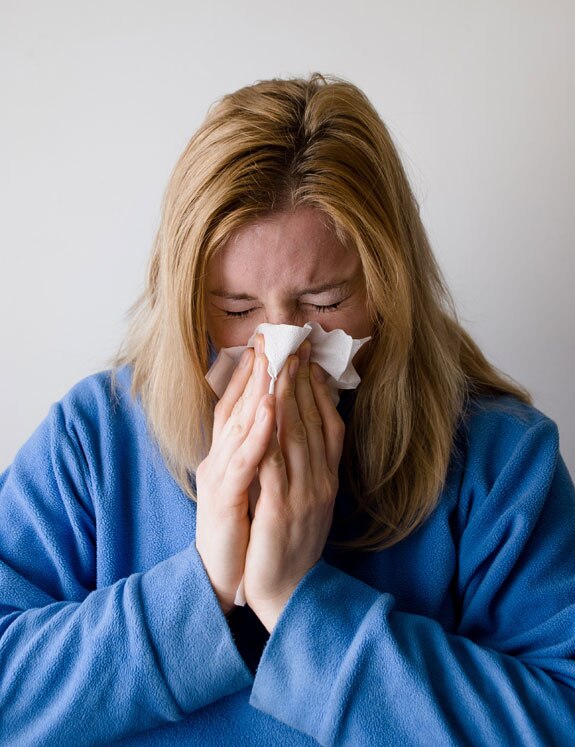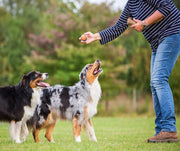I'm Allergic To My Pet - Now What?

Arguably one of the saddest situations an animal lover can ever find themselves in is having an allergic reaction to their pet.
Paint this mental picture.
Growing up, you've always loved dogs and cats. There's just something about your furry friends that you just absolutely adore. You arrive home, and the first thing on your mind is greeting them and showering them with affection. You co-exist in perfect harmony, and everything is going well.
All of a sudden, during one of your belly-rubbing sessions with your pooch, you start to sneeze aggressively. At first, you shrug it off as a one-time thing but notice it begins to happen repeatedly.
Suddenly, it dawns on you.
You're allergic to your pet!
Veterinarians and health organizations are well aware of the attachment pet owners have to their pets. Luckily for most of us, there have been enough studies to help identify the causes, symptoms, and what to do, should instances arise.
THE CAUSES OF ALLERGIES
Just like any other mishap, it's important to remember that allergies do have their causes.
Allergies often occur when your immune system reacts strongly to a substance such as pollen, mold, or in this case, pet dander (dead skin cells). Your immune system is responsible for producing proteins known as antibodies. These antibodies are responsible for protecting you from unwanted "invaders" such as viruses or bacteria that could make you sick or cause an infection. When you have allergies, your immune system responds with antibodies that identify your particular allergen as something harmful, when in fact, it isn't.
Individuals with pet allergies often have over-sensitive immune systems. They can react to harmless proteins found in your pet's urine, saliva, or dander. The symptoms that result are known as allergic reactions, and the substances that cause the allergic reaction are called allergens. After you inhale an allergen or come into contact with it, your immune system responds and produces an inflammatory response, often through your nasal passage or lungs.
Unfortunately, pet allergens accumulate on household items, such as furniture, floors, and other surfaces, and these allergens don't lose their strength for quite a bit of time. On rare occasions, the allergens may remain at high levels for a prolonged time and stick to walls, clothing, or other areas of your home.
SYMPTOMS OF ALLERGIES

For what it's worth, pet allergies tend to yield the same symptoms as allergies found in the air:
- Sneezing
- Runny nose
- Itchy, red, or watery eyes
- Itchy nose
- Irritated roof of mouth or throat
- Nasal congestion
- Cough
- Postnasal drip
- Frequent awakening
- Facial pressure and pain
- Swollen, blue-colored skin under your eyes
However, if allergen levels are low, or sensitivity is minor, symptoms may not appear until after several days of contact with the pet. On very rare occasions, certain airborne particles are small enough to get into the lungs, and this exposure can lead to breathing problems.
TREATMENT FOR ALLERGIES
A vast majority of experts agree that if symptoms persist and cases get severe, the best option is to remove your pet from the home. Depending on how severe the case is, a lot of pet parents understandably refrain from doing so, so here are some alternatives you may want to consider.
1. Antihistamine – these block the effects of chemicals that trigger dog allergy symptoms. They're commonly sold over the counter, known as cetirizine, diphenhydramine, fexofenadine, and loratadine.
2. Decongestants – these are known to reduce swelling in the nose and relieve congestion. Some of the names you may look for that are readily available are over-the-counter Sudafed and Allegra-D.
3. Allergy shots – another option for people with dog allergies – although they may not work for everyone – are known to help certain people with serious pet allergies. If unsure, always consult your doctor for pros and cons.
When it comes to day-to-day life, most allergists recommend the following:
- Keep a fair distance from your pets and avoid going to homes with pets.
- If possible, own pets with no fur or hypoallergenic breeds
- Have antihistamines on hand at home
- Be aware of visitors with pets
- Clean, clean, and clean some more. Be sure to vacuum floors, wash your pet's bedding, and sweep! Use this guide to make sure you're not using any chemicals that could be a potential hazard to your pet.
- Filter the air
It also helps to keep your pet out of your bedroom and off your bed. This will help you sleep much better during the night. A closed door won't completely seal out the dander, but it sure does help.
A FINAL WORD
While a few of these recommendations can help you stand up to these allergies, these are merely temporary fixes. As always, should the above steps prove to be ineffective, it's best to consult the help of a professional.
Previous article

Next article

Related posts
View all-

Keep Your Pets Safe During the Holidays
The holiday season brings joy, festivities, and a break from the usual routine. While you're enjoying the celebrations, it's important to remember that the holidays can present unique challenges for our furry family members. The new sights, sounds, and people can be overwhelming, and common festive items can pose unexpected risks.
Read Article -

Holiday Gifts for Every Pet Personality: The Ultimate Guide
The holiday season is finally here, and for many of us, that means finding the perfect presents for the ones we love most—our pets. Whether they are a steadfast dog who never leaves your side or an independent cat who graces you with their presence on their own terms, our pets are cherished members of the family. They deserve to celebrate right alongside us, stocking stuffers and all.
Read Article -

How to Keep Your Pet Calm During Thanksgiving
Thanksgiving is a time for family, friends, and food, but for our pets, the holiday can be overwhelming. The sudden change in routine, unfamiliar faces and scents, and increased noise can trigger significant stress. Understanding why your pet might feel anxious is the first step toward creating a peaceful holiday experience for everyone, including your furry family members. This guide offers calming tips for pets and practical solutions to ensure your dog or cat feels safe and secure during the festivities.
Read Article



